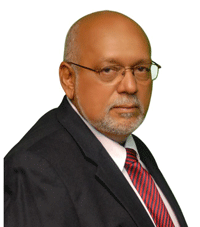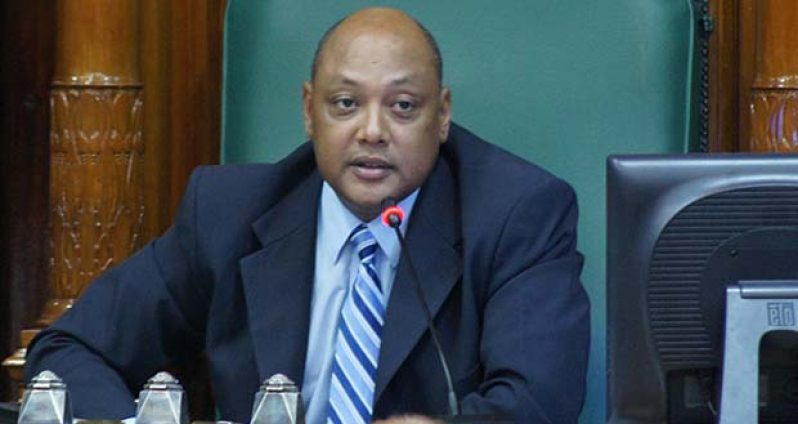“IF the Government wanted to do something with the 10th Parliament, they should have dissolved it.”
This was the contention expressed by the Speaker of the National Assembly, Raphael Trotman, during an interview with the Guyana Chronicle.
His comments followed Monday’s prorogation of Parliament by President Donald Ramotar and at the time the Head of State made it clear that his intention was to give dialogue a chance to address the impasses that have characterised the political arena since the 2011 elections, rather than have Parliament dissolved, as promised by the combined Opposition, via the Alliance for Change (AFC) sponsored no-confidence motion.
“Prorogation is nothing new…it was not done, as the Opposition is trying to say, it is not a restriction of our democracy, the act itself is rooted in the Constitution. What the Opposition was proposing was to close down Parliament, but what I am doing is to extend the life of Parliament to give an opportunity for us to meet and talk on these matters.” – President Donald Ramotar
The act of prorogation is constitutionally rooted, as indicated in Section 70 (1) of Guyana’s Constitution.

“At the end of the day using the tool of prorogation, although provided for in the Constitution, was not in anyone’s best interest…(but) at the end of the day it (prorogation) has happened and we have to get ourselves out of it. I don’t believe anyone wants us to be in a perpetual state of prorogation,” Trotman opined.
DIALOGUE IS ALWAYS A MUST
According to him, while he does not agree with the President’s decision, he firmly supports dialogue.
The Speaker said: “I would agree that there is need for more talks…I believe that dialogue must always be on the table in any situation, even when it appears to be bleak and hopeless, there must always be the hope of reconciliation and resolution.”
“While I do not agree with what has happened, I am not going to sit down and cry. The parties have to find mature and feasible ways of moving us out of the current situation.”
“…if there are one or two issues affecting these issues from being addressed, we have to identify those issues and work to address them….I believe in the political parties there is wisdom and there are people who are prepared to put Guyana first.”
At the time of the prorogation announcement, Trotman came out strongly against the President’s decision.
Asked about the position he took on the matter, given that the President’s act was constitutional, he said: “As a Speaker it is my job to protect the National Assembly. I don’t feel that I was harsh. I was truthful and I stood for what I believe.”
“We all have our respective positions to take. The President took his and he has come in for criticism. I took mine and I have come in for criticisms….I must protect the National Assembly and he must protect his Government. There is nothing wrong with us taking our respective positions.”
The President’s decision to prorogue Parliament essentially means that the current session, the first session of the 10th Parliament, is suspended up to a maximum of six months.
IMPACTS OF PROROGATION
The effect of ending a session by prorogation is to terminate business. Members are released from their parliamentary duties until Parliament is next summoned. All unfinished business is dropped from or “dies” on the Order Paper, the National Assembly’s agenda, and all committees lose their power to transact business, providing a fresh start for the next session. No committee can sit during a prorogation. Bills which have not received Royal Assent before prorogation are “entirely terminated” and, in order to be proceeded with in the new session, must be reintroduced as if they had never existed.’
Commenting on the effects of the prorogation, Trotman said, “There are a number of bills that were on the Order Paper, the hope of them being addressed now is lost. Should they be brought back if Parliament resumed they will have to start from scratch. I don’t see how the prorogation will actually help that process.”
This contention was not supported by Leader of the House and Prime Minister, Samuel Hinds, who in an exclusive interview with this newspaper explained that while all unfinished business will be dropped from the Order Paper, when they are returned it does not necessarily mean starting from scratch.
“It will all start from scratch, but the matters that come back the next time around will progress rapidly because there was much work done already….we could be able to get through all this very quickly,” Mr. Hinds said.
“If the Government wanted to do something with the 10th Parliament, they should have dissolved it…at the end of the day it (prorogation) has happened and we have to get ourselves out of it.” – House Speaker, Raphael Trotman
DISSOLUTION STILL AN OPTION
Meanwhile, President Ramotar, in an invited comment, reiterated that his reasoning to move to prorogation was to give dialogue a choice.
However, he was emphatic that if dialogue fails he will not re-prorogue Parliament; rather he will move to general elections, as dissolving Parliament, as Trotman suggested, is still an option that he has.
Mr. Ramotar said: “The Constitution gives me the power to do both, I chose this one (prorogation) because, clearly, there are advantages as it can open the door for dialogue; failing which there is nothing stopping me from doing what Trotman suggests.”
The Head of State also decried much of the criticisms of his decision to prorogue Parliament.
“Prorogation is nothing new…it was not done, as the Opposition is trying to say, it is not a restriction of our democracy, the act itself is rooted in the Constitution. What the Opposition was proposing was to close down Parliament, but what I am doing is to extend the life of Parliament to give an opportunity for us to meet and talk on these matters,” he said.
He added: “Failing that (dialogue), we will not have an option, but to go back to the polls, but I think it is important to give Guyana a chance, and that is what this prorogation will do.”
Mr. Ramotar also expressed confidence that his Government will be returned to power, even if a general election is held tomorrow.
The last general and regional elections were held on November 28, 2011.
(By Vanessa Narine)



.jpg)









